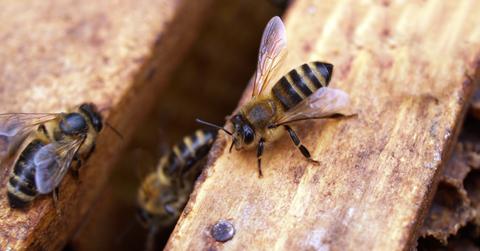Berlin Just Opened A 'Bee Hotel' To Save The Bees
Tourists come to see historical buildings and parks in Berlin everyday. This initiative from two scientists wants to both support bees with a place to live, but also educate the public about how bees are needed and can be raised even in urban environments.
Updated May 13 2019, 5:26 p.m. ET
In 2010, biologist Corinna Hoelzer and her husband Uwe Marth established an initiative in Berlin called, "Berlin is buzzing!"
To encourage the waning bee population, they began building hives on buildings around the city, many of them landmarks and tourist hotspots, including the city’s state legislature building, a theater, the planetarium, and the German finance ministry. There's even one in the yard of the German president’s residence.
They wanted to help the bees, but they also wanted to spread the word about what bees and other pollinators do for the city around them. Having the colonies thriving where people could see and learn about them was important. They're now on 15 buildings, according to the Washington Post, and house around 30,000 bees.
The couple was inspired by an amateur beekeeper in Paris, who cared for a bee colony on the roof of the city's opera house in the 1980s. Berlin adopted the practice of celebrating World Bee Day, according to the U.N. General Assembly's vote in December. The day began thanks to beekeepers in Slovenia, but has quickly become popular.
German Chancellor Angela Merkel said in prepared remarks on Wednesday that people should “think about biodiversity and do something good for bees” in celebration, and remarked that a bee is the perfect example of “something that perhaps seems a bit small to some people, but is actually really big.”
There are a number of factors involved in the decline of bee colonies around the world, such as the use of insecticides, parasites, disease, climate change, and lack of diversity in their food supply. We are incredibly dependent on the health of bees for our own food supply, and the danger they face will be faced by us as they disappear.
“Honeybees are a great reference to explain everything else,” Hoelzer says. “Without pollinators, we don’t have a healthy ecosystem.”
“Berlin is buzzing!” has expanded with its sister initiative “Germany is buzzing!,” putting bee hives in 25 German cities. They also organize workshops on “bee-friendly gardening” that help support the hotel "guests" looking for food nearby. But it took some time to get there.
“Right at the beginning, we had to fight with caretakers because they were afraid they would be stung,” Hoelzer says. “A lot of them have no idea how bees react.”
Now, the bees are part of the tourism draw. Marth actually sells honey from his hive on a cathedral in the gift shop downstairs. Though some may question if the bees love living out of the forest and field, Marth says, “They only need water and a good supply of food.”
So we need more urban gardens? Sounds great!
